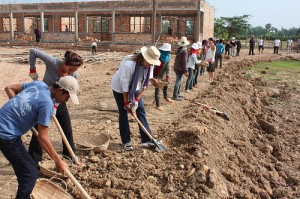A few weeks ago Tourism Concern, a UK-based non-profit focused on ethical tourism and travel, announced that they will soon be launching Gap Year and International Volunteering Standard (GIVS). GIVS is a voluntourism standardization program that will ensure that voluntourism companies are regulated and are a benefit to the destination communities. As you may recall from my last post about voluntourism, voluntourism programs often operate to maximize their own profits rather than make a sustainable impact, and that is what GIVS seeks to correct. Organizations who seek GIVS certification as responsible and sustainable businesses will have to submit to independent third-party assessment in order to demonstrate that they have achieved the required standards.
Those standards include things like: achievable objects that have been identified by host partners and communities; fair, consistent and transparent recruitment procedures; appropriate preparation, training, and induction for volunteers; and ensuring the safety and well-being of volunteers and the members of the destination community. Once an organization has submitted to the independent review and received accreditation the process will have to be repeated every two years in order to ensure continuing good work and progress.
procedures; appropriate preparation, training, and induction for volunteers; and ensuring the safety and well-being of volunteers and the members of the destination community. Once an organization has submitted to the independent review and received accreditation the process will have to be repeated every two years in order to ensure continuing good work and progress.
Though the program has not yet officially launched (the announcement only said that the program would be launched sometime in the near future) the internet voluntourism community is already engaged in debate over GIVS. You can read some of the responses to the announcement here and here, but I’ll summarize the debate here. Basically, there is concern over whether or not this program is a marketing ploy (remember my post about Sandals?) whereby voluntourism organizations can pay a fee to get a meaningless certificate they can use to make themselves look better to potential volunteers. Another concern is that by legitimately auditing and verifying voluntourism organizations Tourism Concern is opening itself up to the threat of serious lawsuits if one of the organizations they verify does not end up being worthy, and so will not stand by their certifications. Tourism Concern, of course, insists that their program is legitimate and that they will not back down if things get difficult.
Regardless of whether or not the program will be meaningful, the issue Tourism Concern is trying to address is highly meaningful. The voluntourism industry is booming, and some sort of certification or regulation seems necessary. There must be a way to make sure that the industry is benefitting the destination community and that money is making its way to the destination community. Unfortunately, that is not easier said than done. Who would come up with regulations? Who would enforce them? The destinations voluntourism companies go to are diverse and have a wide variety of needs, meaning that different organizations would measure the impact they were making in different ways. For example, the needs of a rural village in South America are very different from the needs of a densely-packed city in Africa. How could there be one set of regulations that can measure the impact of voluntourism programs in both such locations? Voluntourism organizations should be focused on meeting the needs of the local community they seek to help, not on some broad checklist of requirements so that they can be certified or accredited. Further, voluntourism is an industry and so naturally is focused on profits, and so setting up and enforcing standards could easily disintegrate into a marketing gimmick–and in some cases already has. There are Voluntourism companies should be accountable to their message of making a sustainable impact and helping the destination community, but coming up with a unified set of standards and someone to enforce them is going to be very difficult. I think the best bet is probably regional organizations, since they will at least have a better idea of what needs to be accomplished in that area. Still, that’s not a perfect solution. Much of the burden should (and does) fall on the voluntourist. Don’t book a trip with an organization that seems to be more focused on profits or on your having a unique experience than on what is needed in the local community. If possible, coordinate your trip yourself by calling up local (to the destination community you wish to visit) organizations to see if they need volunteers and by booking your own stay in local hotels or guest houses. We cannot rely on regulating agencies to take care of everything, especially not in an area as complex as volunteer tourism.
Michelle Bovée is a SISGI Group Program and Research Intern focused on international affairs, economic development, and responsible tourism. To learn more about the SISGI Group visit www.sisgigroup.org



4 pings